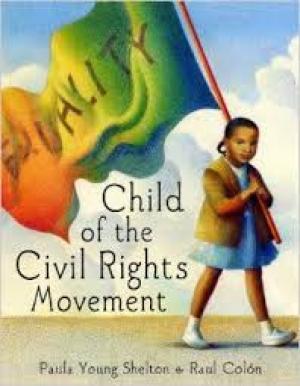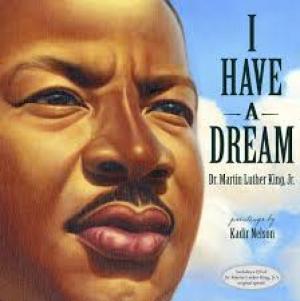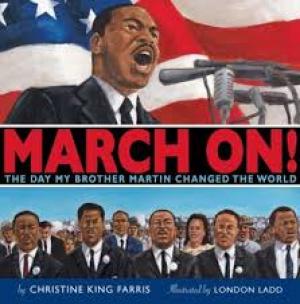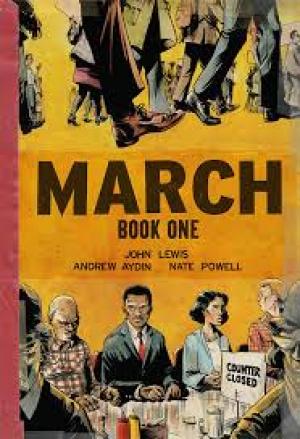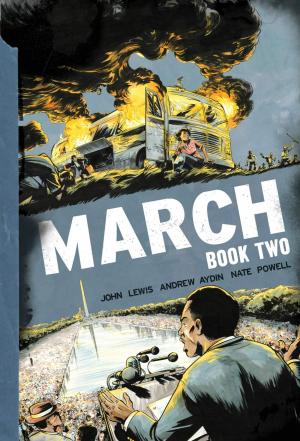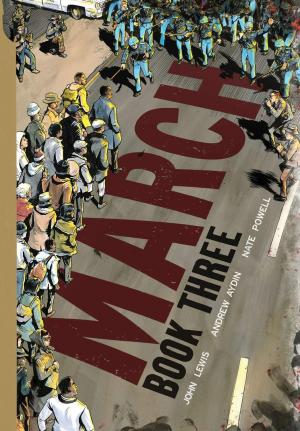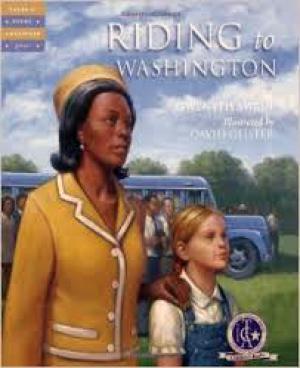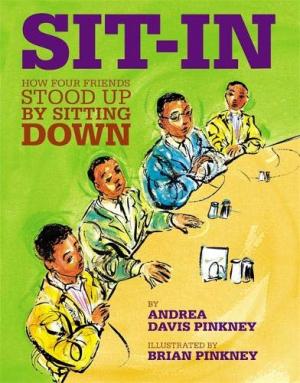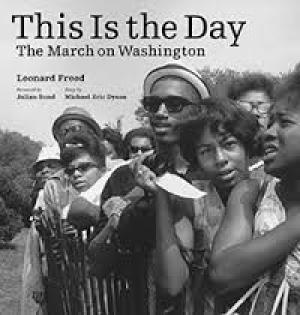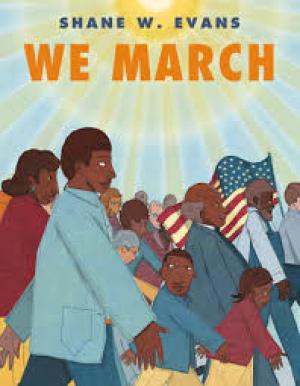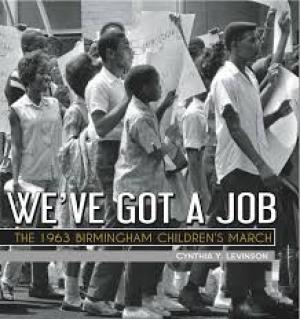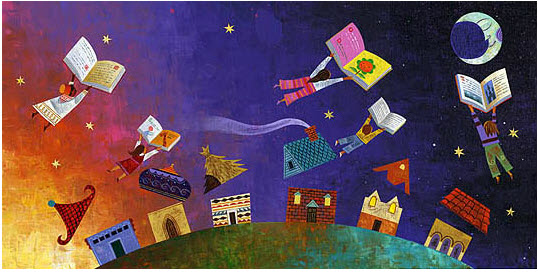March on Washington: 1963
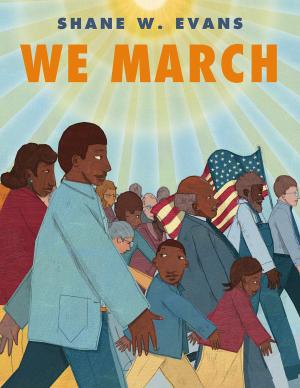
The titles in this booklist focus on the historic events of the March on Washington in August of 1963, including events leading up to the March and the famous speeches delivered.
In addition, the list includes books about related Civil Rights marches from the same period told from the point of view of children.
Classroom Resources
For more classroom ideas, take a look at these lesson plans and a free online edition of Cobblestone Magazine's March on Washington issue from the Albert Shanker Institute.
Additional classroom materials are available from:
Child of the Civil Rights Movement
The youngest daughter of civil rights leader Andrew Young shares a time when she and her two older sisters moved from New York to Atlanta to protest and ultimately change unfair laws. The narration is innocent and child-like — effectively describing what Jim Crow was and giving glimpse of the leaders of the period (including Martin Luther King, Jr.). Soft lined, textured illustrations evoke the time and its tenor while portraying people in a recognizable way. An end note provides additional information about the people depicted.
Coretta Scott
"Unflinching verse and elegant imagery combine in a powerful, evocative, picture-book portrait of Coretta Scott King. As stated on the cover, Shange uses poetry to recount Coretta Scott's life, from her childhood to her marriage with Martin Luther King, Jr. On the final page, the author offers a linear, prose biography, adding context to her more abstract references in the poetry." — Booklist
I Have a Dream
Perhaps one of the best known speeches of the 20th century, Martin Luther King's "I Have a Dream" has been combined with lush paintings in a large format for a new generation. Included in this stunning book is a CD of Dr. King's original speech.
March On! The Day My Brother Martin Changed the World
Martin Luther King, Jr. prepared diligently for his now famous "I have a dream" speech given on August 28, 1963 during the March on Washington for Jobs and Freedom. It was King's unshakable belief in nonviolence and the power of words that galvanized the country. This informal account is both personal and satisfying as revealed by Martin's older sister who watched it on television with their parents in Atlanta. Full-color illustrations and expressive typography highlight words and enhance the tone.
March: Book 1
Product Description: The late Congressman John Lewis was one of the key figures of the civil rights movement. His commitment to justice and nonviolence took him from an Alabama sharecropper's farm to the halls of Congress, from a segregated schoolroom to the 1963 March on Washington, and from receiving beatings from state troopers to receiving the Medal of Freedom from the first African-American president. Part 1 of this graphic novel trilogy tells his story.
March: Book 2
After the success of the Nashville sit-in campaign, John Lewis is more committed than ever to changing the world through nonviolence — but as he and his fellow Freedom Riders board a bus into the vicious heart of the deep south, they will be tested like never before. Faced with beatings, police brutality, imprisonment, arson, and even murder, the movement’s young activists place their lives on the line while internal conflicts threaten to tear them apart.
March: Book 3
Welcome to the stunning conclusion of the award-winning and best-selling MARCH trilogy. By the fall of 1963, the Civil Rights Movement has penetrated deep into the American consciousness, and as chairman of the Student Nonviolent Coordinating Committee, John Lewis is guiding the tip of the spear. Through relentless direct action, SNCC continues to force the nation to confront its own blatant injustice, but for every step forward, the danger grows more intense: Jim Crow strikes back through legal tricks, intimidation, violence, and death.
My Uncle Martin's Big Heart
My Uncle Martin’s Big Heart is a story about love: love between a young girl and her uncle, and all the love she sees her uncle share — with his family members, with his church congregation, and with all people. In this inspiring narrative about Martin Luther King Jr. — told by his niece — young readers will discover the story of the man behind the civil rights hero and activist, one of the most influential figures of the twentieth century.
My Uncle Martin's Words for America
Martin Luther King's niece recalls how the power of her uncle's words and his strength of conviction changed the United States. Realistic illustrations, straightforward language, and factual back matter create an accessible glimpse of the man and his place in history.
Riding to Washington (Tales of Young Americans)
"Traveling by bus with her dad to Washington, D.C., in August 1963, a young girl from an all-white neighborhood isn't sure what awaits her. But on the journey, she encounters discrimination when restaurants refuse to serve mixed crowds, and she's made aware of a No Coloreds sign at a gas-station restroom, which she helps a passenger challenge. Then, as part of the huge gathering in Washington, she hears a speech by Dr. King, and she understands that the dream he speaks of belongs to everyone." — Booklist
Sit-In: How Four Friends Stood Up by Sitting Down
The words of Dr. Martin Luther King, Jr., inspired four students to protest in a way that ultimately changed the United States. Their peaceful dissent at the segregated lunch counter in Greensboro, North Carolina, would "combine black with white to make sweet justice." The "Greensboro Four" began their sit-in on February 1, 1960 and contributed to the passage of the 1964 Civil Rights Act. The text suggests storytelling and is accompanied by light-lined but evocative illustrations; back matter completes this compelling portrait.
This Is the Day: The March on Washington
Product Description: This Is the Day: The March on Washington is a stirring photo-essay by photographer Leonard Freed documenting the March on Washington for Jobs and Freedom of August 28, 1963. This book commemorates the fiftieth anniversary of the historic march that ultimately led to the passage of the Civil Rights Act of 1964.
We March
Two children aroused by their parents join the March on Washington in 1963. Short sentences and semi-abstract illustrations convey the children's evolving feelings as they join scores of others in what adults recognize as an historic march for civil rights.
We've Got a Job: The 1963 Birmingham Children's March
Product Description: This book tells the little-known story of the 4,000 black elementary-, middle-, and high school students who voluntarily went to jail in Birmingham, Alalama, between May 2 and May 11, 1963. Fulfilling Mahatma Gandhi's and Dr. Martin Luther King, Jr.'s precept to fill the jails, they succeeded where adults had failed in desegregating one of the most racially violent cities in America. Featuring four of the original participants, We've Got a Job recounts the astonishing events before, during, and after the Children's March.
Multicultural Literature
See more great related resources and videos in our Multicultural Literature section!

